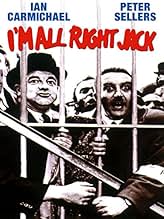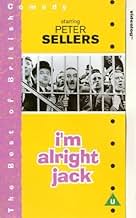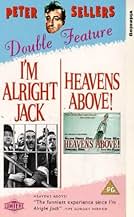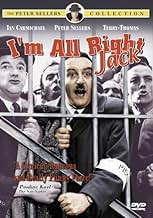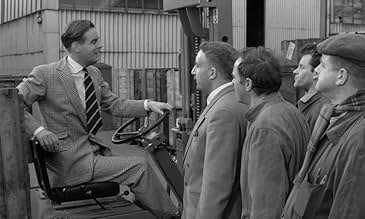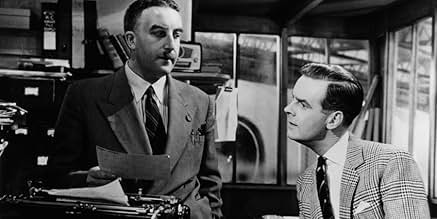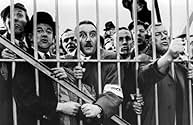VALUTAZIONE IMDb
7,1/10
4614
LA TUA VALUTAZIONE
Un aristocratico ingenuo in cerca di una carriera inizia a sentirsi combattuto tra seguire lo zio con la mentalità solo per i soldi e un aggressivo sindacalista.Un aristocratico ingenuo in cerca di una carriera inizia a sentirsi combattuto tra seguire lo zio con la mentalità solo per i soldi e un aggressivo sindacalista.Un aristocratico ingenuo in cerca di una carriera inizia a sentirsi combattuto tra seguire lo zio con la mentalità solo per i soldi e un aggressivo sindacalista.
- Regia
- Sceneggiatura
- Star
- Ha vinto 2 BAFTA Award
- 3 vittorie e 1 candidatura in totale
Dennis Price
- Bertram Tracepurcel
- (as Denis Price)
Recensioni in evidenza
After the second world war is over, a new spirit of togetherness is fostered in the UK, and industry blossoms. Eager to get involved, the well-to-do Stanley Windrush tries to get a management job but fails. However some friends of the family, head of industry types get him a job with the workers at a missile factory. However his enthusiasm gets him in trouble with the all-powerful unions but is that what the bosses planned for all along?
First of all I cannot believe that this film has so few votes and comments (at time of writing this it's 270 and 5 respectively). I know this doesn't correlate with the number of users who have seen the film but it is a fair representation! I find that shocking, as this is one of the stronger satires I've seen for a good long while. The plot is a sort of comedy ploy by the bosses to shift work around to other firms (by relying on their own firm striking) and get personally rich as a result, however it is the satirical edge that makes it worth watching. Both bosses and unions get it in the neck here neither coming off well in the wash!
Bosses are seen as profit driven and not looking at the greater good, workers on the other hand are seen as looking after themselves while the unions cause more problems than they solve! There is an element of truth in all this that's why it is funny although it is obviously laid on a bit strong in the name of comedy. As a current worker in the UK manufacturing industry (yes, there is some left although it's an American company!) I am greatly amused by the caricatures as some elements (happily less each year) of them can still be seen in my place of employment! The management get off quite light as they are actually, at core, trying to improve the business's efficiency and thus compete with foreign firms. The workers and the unions get the hardest stick which is a little unfair after all the workers make the least and are the ones at risk, while the unions have brought about great steps in workers rights. For example it was funny for me to see FLT's moving around in heavily pedestrianised areas nowadays many larger factories will be totally segregated between vehicles and workers.
The plot does manage to mix the swipes so that it seems fair on the surface it is a pretty damning dig at British industry and, from modern views, it is quite prophetic as British industry has really fallen in the past few decades. The `one out, all out' strike mentality is well spoofed here but there's no doubting the damage that it (with other factors) has had. The only downside of the film looking back, is the racist views and racist language that is used at a couple of moments but in fairness these are not THAT offensive and can be overlooked as the culture of the film at the time.
Despite the quite anti-union feel to the film, Sellers does well to not overplay his character. The socialist worker type is really easy to get laughs off but Sellers brings out character and doesn't just go for an out and out mockery of the character. Carmichael is OK in the lead but is overshadowed by the sheer depth of excellent support roles. Le Mesurier's excellent, twitchy efficiency expert, Thomas' manager sweating and terrified of the workers he calls `an absolute shower' in the way only he can say it! Further faces fall into the film in the distinguished shapes of Attenborough, Rutherford and Price to name a few.
Overall this film comes out as a very classy satire. It hits the nail on the head and, over 40 years later, much of it can still be seen today and the damage from the stuff it satirises is being felt. The film is funny if you have a passing understanding of British industry in terms of politics, workers rights and unions even without this understanding the central plot is broad enough and funny enough to be worth seeing!
First of all I cannot believe that this film has so few votes and comments (at time of writing this it's 270 and 5 respectively). I know this doesn't correlate with the number of users who have seen the film but it is a fair representation! I find that shocking, as this is one of the stronger satires I've seen for a good long while. The plot is a sort of comedy ploy by the bosses to shift work around to other firms (by relying on their own firm striking) and get personally rich as a result, however it is the satirical edge that makes it worth watching. Both bosses and unions get it in the neck here neither coming off well in the wash!
Bosses are seen as profit driven and not looking at the greater good, workers on the other hand are seen as looking after themselves while the unions cause more problems than they solve! There is an element of truth in all this that's why it is funny although it is obviously laid on a bit strong in the name of comedy. As a current worker in the UK manufacturing industry (yes, there is some left although it's an American company!) I am greatly amused by the caricatures as some elements (happily less each year) of them can still be seen in my place of employment! The management get off quite light as they are actually, at core, trying to improve the business's efficiency and thus compete with foreign firms. The workers and the unions get the hardest stick which is a little unfair after all the workers make the least and are the ones at risk, while the unions have brought about great steps in workers rights. For example it was funny for me to see FLT's moving around in heavily pedestrianised areas nowadays many larger factories will be totally segregated between vehicles and workers.
The plot does manage to mix the swipes so that it seems fair on the surface it is a pretty damning dig at British industry and, from modern views, it is quite prophetic as British industry has really fallen in the past few decades. The `one out, all out' strike mentality is well spoofed here but there's no doubting the damage that it (with other factors) has had. The only downside of the film looking back, is the racist views and racist language that is used at a couple of moments but in fairness these are not THAT offensive and can be overlooked as the culture of the film at the time.
Despite the quite anti-union feel to the film, Sellers does well to not overplay his character. The socialist worker type is really easy to get laughs off but Sellers brings out character and doesn't just go for an out and out mockery of the character. Carmichael is OK in the lead but is overshadowed by the sheer depth of excellent support roles. Le Mesurier's excellent, twitchy efficiency expert, Thomas' manager sweating and terrified of the workers he calls `an absolute shower' in the way only he can say it! Further faces fall into the film in the distinguished shapes of Attenborough, Rutherford and Price to name a few.
Overall this film comes out as a very classy satire. It hits the nail on the head and, over 40 years later, much of it can still be seen today and the damage from the stuff it satirises is being felt. The film is funny if you have a passing understanding of British industry in terms of politics, workers rights and unions even without this understanding the central plot is broad enough and funny enough to be worth seeing!
I was quite surprised with this film, not because of liking it (I did), but just how much union politics the Boulting Brothers put on their sleeve with working on this movie. I have been in a Union business that failed before, and I was quite shocked at how much I could compare my own experiences with what was on display here with the Unions and Management trying to maneuver themselves ahead of on another. While Peter Sellers does put on a great performance, this really is Ian Carmichael's movie. I hadn't seen any of his work, and this was a great introduction. All of the other cast is great as well. One final note, it probably contains the most annoyingly catchy title song ever, it'll probably haunt your cranium for days.
The cast alone is a triumph in this movie - some of the best British character actors who ever lived are here: Terry Thomas, Miles Malleson, John Le Mesurier, all backing up Ian Carmichael as the earnest, silly-ass upper-class bumbler and Peter Sellers as Fred Kite, the Marxist shop steward. Sellers in particular is wonderful; his Fred Kite is a lower class striver who has acquired just enough education to give him an inflated idea of his own abilities, but not enough to realize the gaps and inadequacies in his views. He is a perfect realization in miniature of Taine's statement that there is nothing more dangerous than a general idea in a narrow, empty mind. He boasts to his Oxford-educated gentleman lodger about the summer course he took at the university once, reminding him in a familiar fashion about the very good marmalade and toast provided by the college, while the obviously wealthy young man politely admits that he wasn't acquainted with the public dining hall during his years there.
The plot becomes more and more complex as the movie progresses, with almost everyone turning out to be on the take. The climax comes in a free-for-all over a bag containing thousands of pounds intended to bribe Stanley into joining the sensible schemers plundering the public while paying lip service to public service and solidarity with the working class. Malcolm Muggeridge has a interesting cameo in this scene, playing himself. Most recent broadcasts of this movie have edited out the disturbing racist statements of the working class characters, but the original movie had no sentimental soft spot for anyone, workers or bosses.
The plot becomes more and more complex as the movie progresses, with almost everyone turning out to be on the take. The climax comes in a free-for-all over a bag containing thousands of pounds intended to bribe Stanley into joining the sensible schemers plundering the public while paying lip service to public service and solidarity with the working class. Malcolm Muggeridge has a interesting cameo in this scene, playing himself. Most recent broadcasts of this movie have edited out the disturbing racist statements of the working class characters, but the original movie had no sentimental soft spot for anyone, workers or bosses.
I'm All Right Jack is directed and produced by John and Roy Boulting from a script by Frank Harvey, John Boulting and Alan Hackney. It's based on the novel Private Life by Hackney and is a sequel to the Boulting's 1956 film Private's Progress. Returning from the first film are Ian Carmichael, Dennis Price, Richard Attenborough, Terry-Thomas, Victor Madden & Miles Malleson. While Peter Sellers (BAFTA for Best Actor) and a ream of British comedy actors of the time make up the rest of the cast.
Looking to force a crooked deal, Bertram Tracepurcel (Price) and his cohort Sydney de Vere Cox (Attenborough) convince Major Hitchcock (Thomas), the personnel manager at the local missile factory, to hire Tracepurcel's nephew, Stanley Windrush (Carmichael), knowing full well that his earnest and wet behind the ears approach to work will cause fractions within the work force. Then it's expected that Bolshoi shop steward Fred Kite (Sellers) will call a strike that will see the crooked plan to fruition.
Between 1956 and 1963 the Boulting brothers produced a number of satirical movies, I'm All Right Jack is arguably the finest of the bunch. Given that it's now admittedly a dated time capsule, for some of the dialogue would simply be shot down in this day and age, one has to judge and value it for the time it was made. The first and most striking thing about the film is that nobody escapes the firing line, this is not merely a device to kick the trade unions with {and a kicking they do get}, but also the government, the media, big industries and the good old chestnut of the old school brigade. All are in the sights of the Boulting's and the team. The overriding message being that all of them are out for themselves, self-interest and feathering of ones nest is the order of the times.
Also winning a BAFTA was the screenplay, with that you still need the cast to do do it justice. Ian Carmichael was an undervalued performer in that he was an unselfish actor feeding set ups to his costars. That is never more evident than it is here where the likes of Margaret Rutherford, Irene Handl, John Le Mesurier, Liz Fraser & Victor Madden benefit greatly playing off of Carmichael's toff twit twittering. But it's Sellers movie all the way. Which considering he didn't want to do the movie originally, saying he couldn't see the role of Kite being funny, makes his turn all the more special. Studying for weeks labour leaders and politico types, Sellers, with suit too tight, cropped hair and a Hitler moustache, nails the pompous militancy of the shop steward leader. It doesn't stop there, couple it with the contrast of Kite's home life, where the Boulting's are slyly digging away at facades, and you get a two side of the coin performance that's a joy from start to finish.
Very much like Ealing's sharp 51 piece, The Man In The White Suit, this is cynical, but classy, British cinema across the board. Throwing punches and with cheek unbound, I'm All Right Jack has razor sharp teeth from which to take a bite of the comedy pie with. 9/10
Looking to force a crooked deal, Bertram Tracepurcel (Price) and his cohort Sydney de Vere Cox (Attenborough) convince Major Hitchcock (Thomas), the personnel manager at the local missile factory, to hire Tracepurcel's nephew, Stanley Windrush (Carmichael), knowing full well that his earnest and wet behind the ears approach to work will cause fractions within the work force. Then it's expected that Bolshoi shop steward Fred Kite (Sellers) will call a strike that will see the crooked plan to fruition.
Between 1956 and 1963 the Boulting brothers produced a number of satirical movies, I'm All Right Jack is arguably the finest of the bunch. Given that it's now admittedly a dated time capsule, for some of the dialogue would simply be shot down in this day and age, one has to judge and value it for the time it was made. The first and most striking thing about the film is that nobody escapes the firing line, this is not merely a device to kick the trade unions with {and a kicking they do get}, but also the government, the media, big industries and the good old chestnut of the old school brigade. All are in the sights of the Boulting's and the team. The overriding message being that all of them are out for themselves, self-interest and feathering of ones nest is the order of the times.
Also winning a BAFTA was the screenplay, with that you still need the cast to do do it justice. Ian Carmichael was an undervalued performer in that he was an unselfish actor feeding set ups to his costars. That is never more evident than it is here where the likes of Margaret Rutherford, Irene Handl, John Le Mesurier, Liz Fraser & Victor Madden benefit greatly playing off of Carmichael's toff twit twittering. But it's Sellers movie all the way. Which considering he didn't want to do the movie originally, saying he couldn't see the role of Kite being funny, makes his turn all the more special. Studying for weeks labour leaders and politico types, Sellers, with suit too tight, cropped hair and a Hitler moustache, nails the pompous militancy of the shop steward leader. It doesn't stop there, couple it with the contrast of Kite's home life, where the Boulting's are slyly digging away at facades, and you get a two side of the coin performance that's a joy from start to finish.
Very much like Ealing's sharp 51 piece, The Man In The White Suit, this is cynical, but classy, British cinema across the board. Throwing punches and with cheek unbound, I'm All Right Jack has razor sharp teeth from which to take a bite of the comedy pie with. 9/10
Superior example of British comedy film making amongst a sea of duds. British film-makers never got it more right than here. Tremendous story and script plus wonderful performances from a whole host of character actors, especially Peter Sellers and Terry-Thomas.
Very funny satire on British industrial relations.
Very funny satire on British industrial relations.
Lo sapevi?
- QuizThe machines in the Num Yum factory are a spoof on the Moloch scenes from Fritz Lang's film Metropolis.
- BlooperWhile Stanley Windrush demonstrates his forklift driving skills for Mr. Waters, he says "Well, I'm shifting these generators from the stores to here, for loading up." He drives over a bump and the (presumed full) boxes bounce as though they were empty.
- Curiosità sui creditiOpening quote: "Oh! Brave New World that hath such people in't" --William Shakespeare
- ConnessioniEdited into Heroes of Comedy: Terry-Thomas (1995)
I più visti
Accedi per valutare e creare un elenco di titoli salvati per ottenere consigli personalizzati
- How long is I'm All Right Jack?Powered by Alexa
Dettagli
- Data di uscita
- Paese di origine
- Lingua
- Celebre anche come
- I'm All Right Jack
- Luoghi delle riprese
- Flexello Factory, 268 Bath Road, Slough, Regno Unito(Stanley Windrush walks up to the factory entrance)
- Aziende produttrici
- Vedi altri crediti dell’azienda su IMDbPro
- Tempo di esecuzione1 ora 45 minuti
- Colore
- Proporzioni
- 1.66 : 1
Contribuisci a questa pagina
Suggerisci una modifica o aggiungi i contenuti mancanti

Divario superiore
By what name was Nudi alla meta (1959) officially released in India in English?
Rispondi


